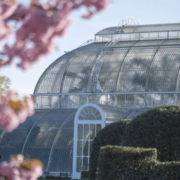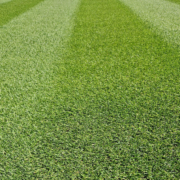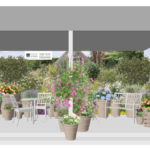May tips from the Barnsdale Gardens team
May tips from the Barnsdale Gardens team: The team at Barnsdale Gardens are so relieved that May is nearly here that they have been busy getting together some handy gardening tips to share with gardeners everywhere! These ideas can be carried over from the 38 individually designed gardens in the East Midlands to home gardens all over the UK!
Sow Swede
As swede is a type of brassica, it should be sown in the same plot as cabbages, Brussels sprouts, kale, broccoli, and other brassicas. Shallow drills should be made, and the seeds should be sown late to combat mildew. The rows should be spaced about 45cm (18 inches) apart. After germination, thin the plants so that they are 30cm (12 inches) apart in the row, giving them enough space to grow into large swedes.

May tips from the Barnsdale Gardens team – Steve Hamilton
Plant out Onions
Any module-grown onions, raised from seed, are now ready for planting on the allotment. Using a string line and planting board, space them 15cm (6 inches) apart.
Pot on Cucurbits
The seeds have been sown into modules to save space and now they need to be transplanted into 8cm (3 inch) pots to grow before planting out. The tray, as seen in the image below, includes courgettes, marrows, and squash, which will all be planted out at the end of the month.
Pot on Peppers
It’s time to transplant the sweet and chilli peppers into their final pots in the greenhouse. Unlike tomatoes or cucumbers, they don’t require as large a pot, so you can use two-litre pots. At Barnsdale multi-purpose compost is mixed with pelleted chicken manure to create a nutrient-rich environment for the plants. Additionally, their feeding is supplemented throughout the growing season with liquid feed
Put Out Summer Containers
If you only have a few, you could try moving summer bedding containers outside from the greenhouse earlier. Make sure to monitor the night time temperatures and bring them back in if there is a risk of frost. By the last week of May, the temperatures should be stable enough for the plants to be safe outside, but always keep in mind that the weather can be unpredictable.
Be Vigilant
With the arrival of new shoots and leaves, pests tend to appear in large numbers, seeking to feed and spread infections. Therefore, it’s important to be vigilant against any trouble. At Barnsdale, the team have to keep an eye on the plants such as lupins and roses, which are prone to greenfly and blackspot, respectively. These are dealt with promptly by crushing the greenfly with fingers and removing any leaves that show signs of blackspot at an early stage before it has a chance to spread.
Protect against carrot root fly
Carrot fly is a pest that can ruin an entire crop by burrowing into and through the roots. It’s best to prevent an infestation rather than deal with it after it has happened. A physical barrier like horticultural fleece or fine netting such as enviromesh is the most effective method to keep carrot flies away. Cover the entire crop and seal the edges and ends to prevent the flies from getting in. The carrots will be protected as long as the barrier stays on. If using enviromesh, make sure it is held above the crop to prevent the flies from laying eggs through the holes. The first attack usually occurs towards the end of the month, so it’s best to apply the protection early to ensure perfect carrots
There’s plenty to see and do all year round at Barnsdale Gardens!
For the latest industry news visit landscapingmatters.co.uk/news
Get all of the big headlines, pictures, opinions and videos on stories that matter to you.
Follow us on Twitter and Instagram for fun, fresh and engaging content.
You can also find us on Facebook for more of your must-see news, features, videos and pictures from Landscaping Matters












